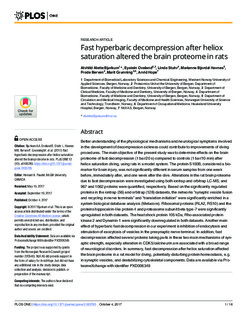| dc.contributor.author | Bjørkum, Alvhild Alette | |
| dc.contributor.author | Oveland, Eystein | |
| dc.contributor.author | Stuhr, Linda Elin Birkhaug | |
| dc.contributor.author | Havnes, Marianne Bjordal | |
| dc.contributor.author | Berven, Frode | |
| dc.contributor.author | Grønning, Marit | |
| dc.contributor.author | Hope, Arvid | |
| dc.date.accessioned | 2019-03-26T14:58:57Z | |
| dc.date.available | 2019-03-26T14:58:57Z | |
| dc.date.created | 2017-10-26T14:02:12Z | |
| dc.date.issued | 2017 | |
| dc.identifier.citation | Bjørkum, A. A., Oveland, E., Stuhr, L., Havnes, M. B., Berven, F., Grønning, M., & Hope, A. (2017). Fast hyperbaric decompression after heliox saturation altered the brain proteome in rats. Plos One, 12(10). | nb_NO |
| dc.identifier.issn | 1932-6203 | |
| dc.identifier.uri | http://hdl.handle.net/11250/2591871 | |
| dc.description.abstract | Better understanding of the physiological mechanisms and neurological symptoms involved in the development of decompression sickness could contribute to improvements of diving procedures. The main objective of the present study was to determine effects on the brain proteome of fast decompression (1 bar/20 s) compared to controls (1 bar/10 min) after heliox saturation diving, using rats in a model system. The protein S100B, considered a biomarker for brain injury, was not significantly different in serum samples from one week before, immediately after, and one week after the dive. Alterations in the rat brain proteome due to fast decompression were investigated using both iontrap and orbitrap LC-MS, and 967 and 1062 proteins were quantified, respectively. Based on the significantly regulated proteins in the iontrap (56) and orbitrap (128) datasets, the networks “synaptic vesicle fusion and recycling in nerve terminals” and “translation initiation” were significantly enriched in a system biological database analysis (Metacore). Ribosomal proteins (RLA2, RS10) and the proteins hippocalcin-like protein 4 and proteasome subunit beta type-7 were significantly upregulated in both datasets. The heat shock protein 105 kDa, Rho-associated protein kinase 2 and Dynamin-1 were significantly downregulated in both datasets. Another main effect of hyperbaric fast decompression in our experiment is inhibition of endocytosis and stimulation of exocytosis of vesicles in the presynaptic nerve terminal. In addition, fast decompression affected several proteins taking parts in these two main mechanisms of synaptic strength, especially alteration in CDK5/calcineurin are associated with a broad range of neurological disorders. In summary, fast decompression after heliox saturation affected the brain proteome in a rat model for diving, potentially disturbing protein homeostasis, e.g. in synaptic vesicles, and destabilizing cytoskeletal components. | nb_NO |
| dc.language.iso | eng | nb_NO |
| dc.publisher | PLoS | nb_NO |
| dc.rights | Navngivelse 4.0 Internasjonal | * |
| dc.rights.uri | http://creativecommons.org/licenses/by/4.0/deed.no | * |
| dc.title | Fast hyperbaric decompression after heliox saturation altered the brain proteome in rats | nb_NO |
| dc.type | Journal article | nb_NO |
| dc.type | Peer reviewed | nb_NO |
| dc.description.version | publishedVersion | nb_NO |
| dc.rights.holder | © 2017 Bjørkum et al. | nb_NO |
| dc.source.pagenumber | 1-16 | nb_NO |
| dc.source.volume | 12 | nb_NO |
| dc.source.journal | PLoS ONE | nb_NO |
| dc.source.issue | 10:e0185765 | nb_NO |
| dc.identifier.doi | 10.1371/journal.pone.0185765 | |
| dc.identifier.cristin | 1508052 | |
| cristin.ispublished | true | |
| cristin.fulltext | original | |
| cristin.qualitycode | 1 | |

